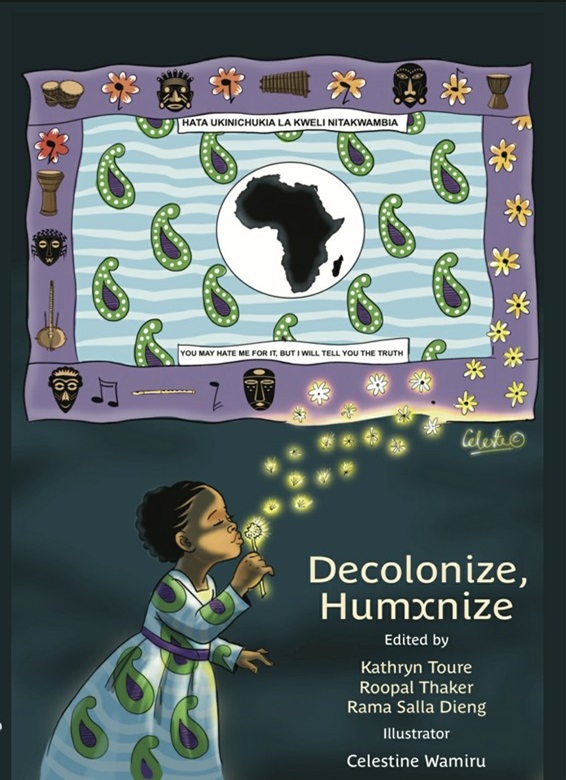edited by Kathryn Toure, Roopal Thaker, Rama Salla Dieng and Celestine Wamiru
Whose knowledge counts? Why delve deep to understand self, history and intercontinental relations? How do people and communities heal from the wounds of colonization and related trauma passed from generation to generation? Such intractable questions are explored in this collection of essays on decolonization. To decolonize means to humxnize, which is of even greater urgency in the 21 st century with colonization showing itself in new forms. Perspectives from several continents suggest pathways toward more convivial and equitable relations in society, and each chapter is presented in conversation with an illustration. The book will inspire young leaders, educators, activists, policymakers, researchers, and anyone resisting colonization and its effects and working for a kinder, gentler world.
Table of contents
1/ What kind of leadership is needed to decolonize minds and societies?
by Lola Adedokun and María José Moreno-Ruiz
2/ The quest for decolonization and effective governance systems in Africa
by Lucy Nyembesi Mabhikwa
3/ Healing from within: Why self-definition and decolonization matter for human security
by Kirindi Odindo
4/ Dancing trees with beating hearts: Exploring feminist power and environmental connections as antidotes to colonial thinking and organizing principles
by Jael Silliman
5/ Feminist political economy, land, and decolonisation in Africa and the Global South
by Rama Salla Dieng and Lyn Ossome
6/ On millets and resistance to coloniality
by Kailash Hariharan Iyer
7/ Decolonisation as conversation and probing questions
by Francis B. Nyamnjoh
8/ On the burning of schoolbooks after examinations
by Mary Njeri Kinyanjui
9/ Anthropology as the disruptor: A reflection on decolonising academic knowledge
by Billan Omar and Rise Tanino
10/ Where I am, Who I am
by Carolyn Tarr
11/ Researching decoloniality and Africanizing postcolonial research in Africa
by Hassan Mbiydzenyuy Yosimbom
12/ Decolonizing international development: Caution, people at work
by María José Moreno-Ruiz and Connie Stitz
13/ Is decolonization more than a buzzword?
by Kathryn Toure


| ISBN | 9789956553587 |
| Pages | 274 |
| Dimensions | 229 x 152 mm |
| Published | 2024 |
| Publisher | Langaa RPCIG, Cameroon |
| Format | Paperback |






8 comments
These 13 instructive and sometimes personal chapters speak to the urgency of decolonization, building on a culture of ubuntu or recognizing oneself in others.
– François-Joseph Azoh, Psychologist, Lecturer at Ecole Normale Supérieure of Abidjan, Cote d’Ivoire
Connections between colonization, racism, and other “isms” are addressed, as are rehumxnizing intercontinental movements such as Black Lives Matter, #MeToo, and #RhodesMustFall.
– Dr. Wanja Njuguna, Senior Lecturer, Journalism and Media Technology, Namibia University of Science and Technology
Embrace this read and learn how we humXns are the X-factor in the liberation from mental and physical bondage.
– Larry Lester, activist and President of the Greater Kansas City Black History Study Group, a branch of ASALH
Decolonization brings a progressive transformation of the world.
– Therese Mungah Shalo Tchombe, Emeritus Professor/Honorary Dean of Education, University of Buea, Cameroon
This book Decolonise Humxnize is an important addition to the Decolonial and Feminist Studies literature. The strength of this book is the focus on the everyday and the marginalised, thus reclaiming humxnity and centring often ignored experiences within a decolonial praxis. The book highlights efforts by activists, feminists, academics, and healers in addressing colonial trauma and colonial ecologies and decolonising knowledge, education, food systems, governance, and international development aid structures using ethics from the global south to reimagine and cocreate a decolonised humxnity.
– Dr. Njoki Wamai, Assistant Professor, United States International University (USIU) – Africa, Nairobi, Kenya
Decolonize, Humxnize shares powerful stories of struggles to deconstruct and disassemble colonized and colonizing perspectives. A common thread throughout: the arduous and sustained work required to establish more equitable relationships and shift patriarchal paradigms. These stories resonate in very humxn ways and are a part of addressing gross power imbalances and reconciling people and peoples.
– Kim Horan, Health Promotion Manager, Department of Health, New Mexico State Government, US
Decolonize, Humxnize beautifully and incisively delves into the imperatives of decolonization, offering profound perspectives on reshaping humxn interactions toward equality. Through Global South lenses, the writers illuminate the complexities of power structures, challenge prevailing narratives, and invite the reader to embrace more inclusive values and reflective practices, rooted in understandings of histories and interdependencies.
– Abby Malan, Leadership Coach, Victoria, Canada (traditional territories of the Lekwungen peoples of the Songhees Nation) and Cape Town, South Africa (traditional territories of the Khoe-Sān people)
My generation, in the early 1960s, was preoccupied with Negritude and Neo-colonialism, following the intellectual lead of such great names as Leopold Sedar Senghor and Kwame Nkrumah. This book (a collection of insightful essays by new-generation bright minds) has carried the interrogative dialogue a step further by focusing on DE-COLONISATION, in its multiple dimensions. It is like saying:
“Even as we struggle with historical wounds, let us construct a more progress-oriented future for ourselves.”
Questioning widely-held assumptions, bringing Gender Equality to the front burner, and addressing its core message to the minds of the sidelined citizen, the book goes beyond making a point to inviting the reader to a serious, in-depth and critical appraisal of the mission of de-colonising the mind (to borrow Ngũgĩ wa Thiong’o’s enticing message) in a practical and sustained manner, so that the erstwhile marginalised and oppressed would progressively evolve into being an accepted and respected world citizen – no longer pushed aside, but fully integrated and widely accepted.
This substantive message of the book is intended for internalisation, and not for mere memorisation. Its motives are idea-generation and thought-sharing. The attention that it draws on the need to HUMXNISE (in place of HUMANISE) is a clarion call to all of us. Its discourse mode goes beyond merely recanting the harm that colonisation has done to throwing open avenues for the exploration of viable ways of re-inventing and re-generating ourselves.
Here then is a book for every one of us: a MUST-READ, a MUST-DIGEST, a MUST REGULARLY CONSULT, and, above all, a MUST-SHARE.
– Emeritus Professor Pai Obanya, University of Ibadan-Nigeria